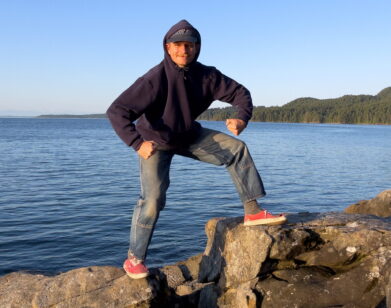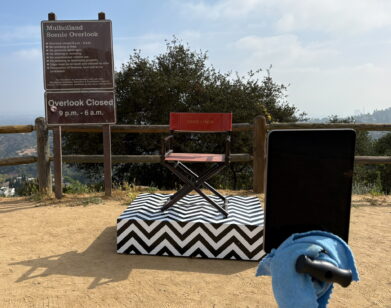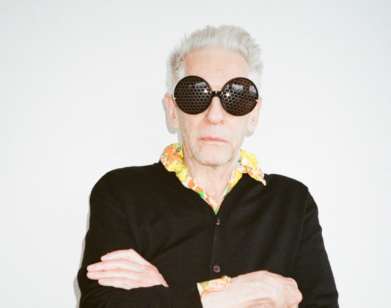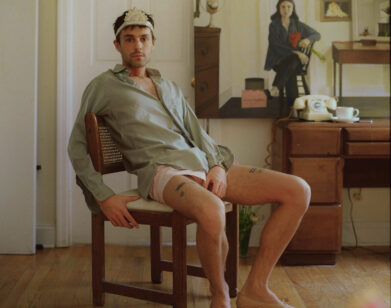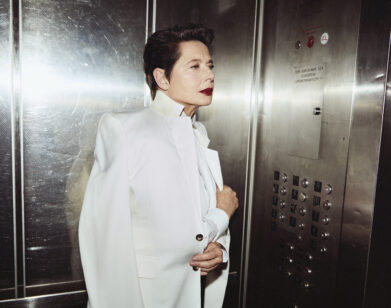Jim Jarmusch and Caleb Landry Jones on SpongeBob, Butthole Surfers, and “This Virus Thing”
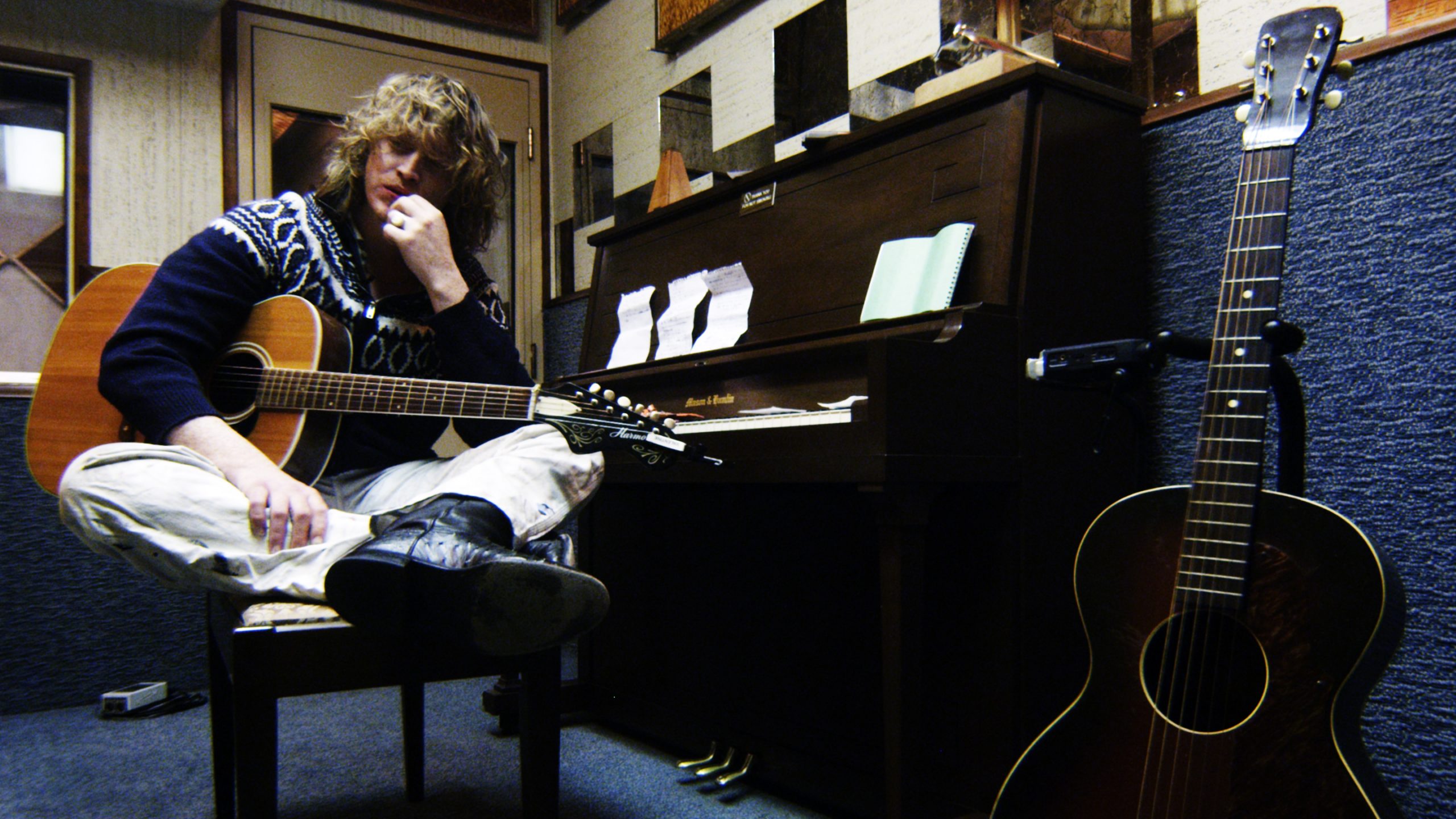
Photos by Jacqueline Castel.
Caleb Landry Jones was first introduced to the world as Boy on Bike #2 in No Country for Old Men, a film he thought was “quite perfect until Boy on Bike #2 rolled up with Boy on Bike #1, who was wonderful.” Somehow, the innocent Boy on Bike morphed into the industry’s most sought-after creepy guy, lending his rumbly intensity to the roles of Jeremy Armitage, the lax bro-slash-white supremacist brother in Get Out; Red Welby, the slimy salesman of Three Billboards Outside Ebbings, Missouri; and Steven Burnett, Amanda Seyfried‘s abusive husband in David Lynch‘s Twin Peaks: the Return.
While he clearly has a knack for making audience’s skin crawl, it was the Texan actor’s breakout television role that most resembles his homegrown, freckled self. As Jimmy Adler on Friday Night Lights, he was the drummer for the best speed metal band in Dillon, Texas—a spiritual cousin of the teenage Jones, who played drums in his high school band and began writing and recording music at age 16, around the time he started acting. (Though his fingers weren’t quite long enough for the saxophone, he soon picked up the guitar, bass, and keyboard, too.) As the descendant of a long line of fiddle players, there’s an idiosyncratic musical tic pulsing through Jones’s veins—which is perhaps why his debut record, The Mother Stone, sounds “sort of like if John Lennon and Brian Wilson visited Daniel Johnston’s basement on psychoactive drugs and the three of them recorded together,” as Jim Jarmusch, who directed Jones in last year’s zombie satire The Dead Don’t Die, put it when he called Jones up at his Texas barn.
The indelible misfit charm of Jarmusch runs deep through the album. When Jones, a lifelong Jarmusch fan, initially met the director, he showed up ready to play a brand-new instrumental solo piano piece as a token of his appreciation. When it turned out that they would be meeting at a diner, with subpar coffee and no piano to be found, they had a conversation instead. Jones slipped Jarmusch two collections of songs he recorded in his barn, from a back-catalog of about 700, and the director introduced him to Caleb Braaten, the founder of the record label Sacred Bones, who has also worked with Lynch. Before long, The Mother Stone was in full swing, its title track, “Flag Day/The Mother Stone,” a culmination of that fateful piece of piano.
While the two are currently sequestered in their respective creative caves, they connected over a lengthy phone call that was as delightfully meandering as Jones himself. —SARAH NECHAMKIN
———
JIM JARMUSCH: Hey, man.
CALEB LANDRY JONES: What’s going on?
JARMUSCH: Where are you?
JONES: North of Dallas. I’m sitting outside my barn.
JARMUSCH: Are you okay?
JONES: Yeah. We just bought some more toilet paper. They’ve limited Collin County residents to two things of toilet paper at a time.
JARMUSCH: Oh man, what a world. What were you working on as an actor before this virus thing came down on us? Did something get canceled in the middle?
JONES: No. I just finished a job. We were in Erfoud, Morocco, for John Michael McDonagh’s movie, The Forgiven. I think we got finished just in the nick of time.
JARMUSCH: Oh, good. I love Morocco. Before we get into music, is it okay to ask a few things about acting?
JONES: Ask whatever you want, Jim. I can’t believe we’re doing this. Like I told you, I stole your movie when I was 17 from Half Price Books and now we’re talking about music and movies.
JARMUSCH: I’m happy to hear your voice, man. You’ve worked with some really interesting people and directors. Do you approach things a different way when you’re working with Sean Baker, David Lynch, or Jordan Peele?
JONES: I think deep down it’s the same. Each film seems to vary in the sense that you’re working with different people and some people don’t want you to be the character all the time. You’ve got to cater to the people around you.
JARMUSCH: But one of your strengths when we were working together was that when given enough room as an actor, you didn’t repeat things in different takes.
JONES: Yeah, but I don’t know if that’s good or bad.
JARMUSCH: You’re gathering stuff while shooting. You gave us the ability to shape your character with different ideas you gave. Some actors do the same take over and over, perfecting the details. But you offer different things. Before I ever met you, I was just blown away by how varied the characters are that you create.
JONES: I still can’t believe I was a part of it. Sometimes I still look at the cover and go “Fuck yeah” to myself. “Fuck yeah, that happened.”
JARMUSCH: I kind of wish that we released The Dead Don’t Die now, because at the time, people didn’t get any kind of warning.
JONES: Too ahead of the curve.
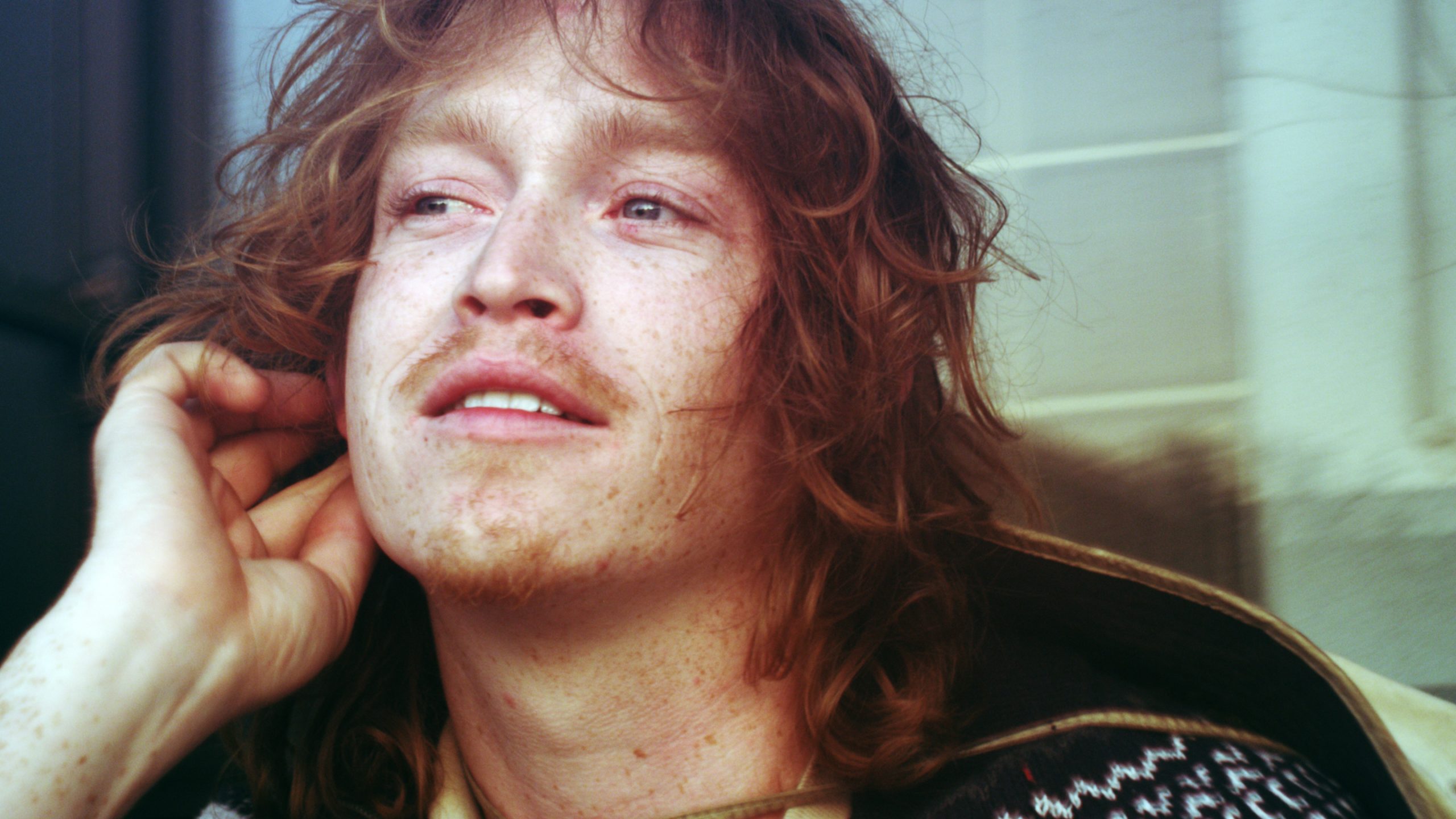
JARMUSCH: Too much for a lot of people, maybe. So, musically, I’ve got to start with your family, because I read that you’re not a fiddle player, but you have a number of generations of fiddle players in your family.
JONES: Yeah. My grammy played for the Dallas Symphony with my grandpa. Her father played and I believe his father played. It went back a fair bit. I think we still have one of the violins. It’s beautiful, but you wouldn’t dare try and play it. I’d love to, but at the same time it feels like one of those things that needs to stay right there where it’s at and not get touched. But I didn’t know that until a few months ago, when I was asking my mom about it. I thought, “Man, you dropped the ball there.”
JARMUSCH: Your grandfather wrote jingles and music, too, right?
JONES: Yeah. He was a fantastic drummer and percussionist. He subbed for Buddy Rich a lot with Tommy Dorsey, and then he was offered certain gigs in L.A. and just never came out there. He stayed in Texas and created a studio at home and really got into jingles. I believe he was doing that for a while, trying to get my mom to sound like one of The Andrews Sisters.
JARMUSCH: When did you start playing drums? I know you had a band called Robert Jones.
JONES: Yeah, in high school. I’ve been playing drums since I was a kid, on pots and pans. I wanted to play other instruments, but the band leader said my fingers weren’t long enough for the saxophone, so he put me on percussion. Which was great because I enjoyed it, but my younger brother plays saxophone and he’s got longer fingers than me.
JARMUSCH: But you also play guitar, keyboard, bass.
JONES: Yeah. But drums are the only thing I could fall into line with a band. Keyboard, I’m going, “What chord is that? Oh geez.”
JARMUSCH: I love your record. It’s remarkable and unusual. Somebody asked me a few months ago, “Give us some idea what it’s like.” And I said, “I don’t know. It’s sort of like if John Lennon and Brian Wilson visited Daniel Johnston’s basement on psychoactive drugs and the three of them recorded together.”
JONES: Except there was someone manning the recording situation other than those three that were making sure it was sounding clearer than it would have if they recorded themselves.
JARMUSCH: You’ve mentioned The White Album in the past.
JONES: Yeah. I think we were talking about that record when we met. We were talking about saving things–saving The Last Detail because I knew there were only so many Jack Nicholson films from that era, or saving The White Album because I knew I had heard the other Beatles records. And then at 21, I was listening to it and it brought back a lot of stuff from when I was a kid. It was a great mix of the absurd and legitimate intellectual property. Outlandish, sarcastic, childish, schizophrenic aspects of some other strange place. The next eight years, I was constantly hearing music in that kind of way.
I think we were talking about Syd Barrett, too—this kind of fumbling down the stairs, where the other musicians are having a hard time keeping up with his recording. You can hear the guy from Soft Machine on drums lagging a little bit on that first record, and then rushing a little bit, but Syd’s rushing and lagging so it’s this kind of beautiful discombobulated effort that I think somehow does something stronger than if it was pristine and perfect. There’s something in it.
JARMUSCH: That’s the beauty of unusual music. There are people who are virtuoso guitarists and they can shred all over the map, and then it doesn’t musically mean anything. And then somebody could be fumbling around on an instrument and make something incredibly expressive. So it’s all a matter of someone’s real creative strengths.
JONES: And also like what you’re doing in films, getting the right people together and then stretching them within these confines.
JARMUSCH: Yeah, collaborating and playing with them.
LANDY JONES: And trying to get something that you know they’re capable of. This was fun with string players and stuff, trying to ask for a little bit of the absurd sometimes, or things that didn’t make sense or tempo changes that didn’t feel right on the first listen. To get them to play in a way that they’re maybe not used to with Hans Zimmer.
JARMUSCH: I know you’ve been writing songs since you’ve been a teenager. Do you write, gather, collect lyrics and ideas, or do you start with melodies?
JONES: I’m always collecting ideas. I used to more, and I’ve kind of stopped because I realized I was just creating massive little notebooks with microscopic writing that would either happen sober or not sober. I had to get better at making ideas where I’d understand them better when I read them again. And at the time, I wasn’t thinking that at all. I was just thinking, “Of course I’ll understand what I’m talking about.” Now I look at it and I understand probably 15 percent of the idea.
JARMUSCH: It’s a mysterious thing. You don’t know when or where things come from. And in a way, it’s not your job to know that or even what they mean. It’s just to channel them.
JONES: Yeah, and they feed themselves if you forget them. For all I know, it’s an old idea that happened when I was 15 that grew for the last however many years, and has only just now sprouted a leaf. And you’re going, “Hello there again. Of course I remember you.” Do you revisit your work ever?
JARMUSCH: If I’ve completed something, I never revisit it.
JONES: Ever?
JARMUSCH: The films, I don’t look at. And even if I have to transfer them to another format or something, in the old days, I’d say, “Do the reels out of order. Take the sound off.” I don’t want to look back, because you can’t change them and you’re not going to learn anything more from them, and I like to look forward.
JONES: I’ve always been the same way with acting, but with music, I find I’m going back quite a bit when I feel low or empty to kind of juice back up and go, “You’re capable of taking ideas and turning them into something.” But acting, I can’t. Acting is very challenging to watch.
JARMUSCH: It’s funny how some actors learn from seeing themselves in dailies and films. I’ve talked to Adam Driver about this, and he would never watch himself because he said he would just say, “Oh my god, do I really walk that way? Are my ears that big?” He would just freak out.
JONES: Yeah, you beat yourself up over stupid things.
JARMUSCH: You’re from Garland, Texas.
JONES: Born in Garland, but from Richardson.
JARMUSCH: Is that close to Fort Worth?
JONES: It’s about 45 minutes or so, depending on traffic.
JARMUSCH: I read a really weird thing that in, I think it was 1966, there were as many garage bands in the Fort Worth area as there were in the rest of the entire state.
JONES: [Laughs] I didn’t know that.
JARMUSCH: I was talking to Gibby Haynes, of the Butthole Surfers from Austin, about this fact, and he was like, “Yeah. I believe that. Everyone was in a garage band in the late ’60s in the Fort Worth area.”
JONES: I think I was first arrested in Garland and born in their hospital. But other than that, I don’t have much to do with Garland.
JARMUSCH: Well, you’re officially in the records for arrests and births.
JONES: Yeah, hopefully. So how’s everybody over there?
JARMUSCH: We had a scare. You remember Josh, our producer. He is on a respirator in Brooklyn. But he is in stable condition and improving. So I’ve been very worried about him. He’s such a lovely, wonderful person. But otherwise, most everyone I know is okay. I don’t know. It’s disturbing.
JONES: I know. I read an article today in the Wall Street Journal—my dad gets The Wall Street Journal. And I gave up reading just because I realized they’ve got to put so many words in something and they only have so much information. I suppose I’ve kept out of what’s really going on. I’m looking at sheep right now, you know what I mean?
JARMUSCH: Oh, I’m trying. We’re keeping the news in our household limited. If it’s on for more than half an hour, then I’m like, “No, we’re watching SpongeBob.”
JONES: The good years. The first eight years of SpongeBob are pretty great.
JARMUSCH: Yeah. I think I’ve seen them all by now.
JONES: You know those images where it gets grotesque?
JARMUSCH: Yes, very bizarre. And the guy with the French accent does the narrating.
JONES: “17 minutes later.”
JARMUSCH: For no reason at all. I love that.
JONES: I mean, there’s no reason at all in a lot of that show. It’s about a fucking sponge.
JARMUSCH: Yeah, it’s just a sponge living under the sea. It makes no sense. Are you making music now during the quarantine?
JONES: Yeah. I’m trying to figure out how to get back to Los Angeles, because we’ve still got to mix one song, and then we’ve got to finish putting drums and keyboards and everything on another one.
JARMUSCH: Well, just keep gathering the tracks. I have my little recording studio. I’ve been trying to work on something every day. I love to just go into my own little world.
JONES: Any ideas you’ve been kicking around lately?
JARMUSCH: Yes, I have two things I’m slowly writing, but I’m too superstitious to talk about them. The last couple weeks I just haven’t been able to write, but I’ve been recording and making some notes. So I’ll get there, I’ve just been a little thrown over here for a minute.
JONES: John Boorman told me this: He gets a phone call and he says, “Hello.” And he goes, “Hey, it’s Stanley.” He goes, “What are you doing?” He says, “I’m writing.” And then John says, “What are you doing?” He says, “I’m writing,” and he hangs up.
JARMUSCH: That’s good. Any special things you’re watching or listening to during this?
JONES: You ever read any P.G. Wodehouse? I’m reading Luck of the Bodkins right now. This guy Monty Bodkin is hilarious. There’s this lady Lotus Blossom who’s an actress, and she keeps a little crocodile in her wicker basket. She asks the steward to get something from the basket. And he reaches down to get it and all of a sudden this little crocodile nearly bites off half of his thumb. And so right now it’s set loose in the ship that they’re all on.
JARMUSCH: I’ve been reading a lot of Carl Hiaasen, the crime writer. It’s also funny and often has animals and smuggled endangered species and weird shit in Florida. And I’ve been watching a lot of Burns and Allen on YouTube. They keep me laughing.
JONES: I never got into George Burns.
JARMUSCH: You’ve got to watch the early shows with his wife, because she’s the hilarious one. When we were working, you got me into Carol Burnett, who I wasn’t really a fan of, and now, I think she’s a genius, man.
JONES: Yeah! I remember you said that, and I was like, “Really? You don’t like Carol Burnett?” “Oh, my Tulip, my sweet Tulip.” Her knees start to buckle and she kind of waddles back a bit. She’s hilarious.
Thanks again for putting me in touch with Caleb [Braaten], because I’ve been waiting, man. I’ve been waiting for the right time and the right person. I was so wary because I didn’t bump into him on the street. Because a friend, Peter, in Austria, told me, “Caleb, you should talk to the people at Sacred Bones. I think they’ll dig what you’re doing.” And then you said, “Caleb, I’m with Sacred Bones. You should get in touch with them. You should get in touch with—his name’s Caleb, funny enough.” I said, “No, Jim. I don’t know, Jim. Okay, Jim. I’ve got my head out of my ass.”
JARMUSCH: Oh, I’m so glad. The world wants it.
JONES: I don’t mean to make this a shmooze-fest all of a sudden. When New York is clear and travel is happening again and all that jazz, you’ll hear from me.
JARMUSCH: Alright, kid. We’ll find a piano this time.
JONES: A piano, a bass, and an amp. Toodles.

